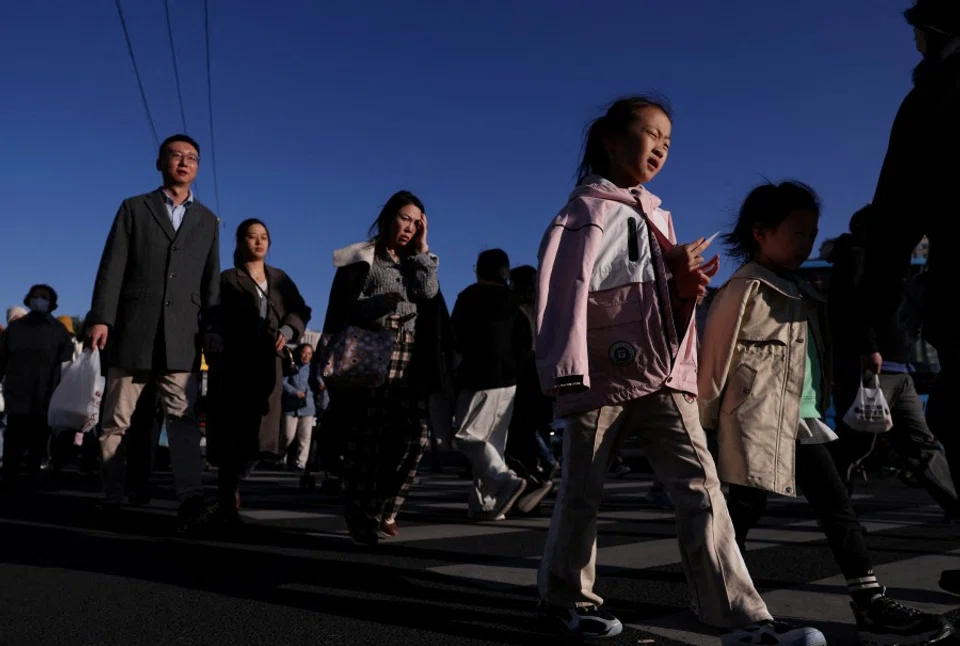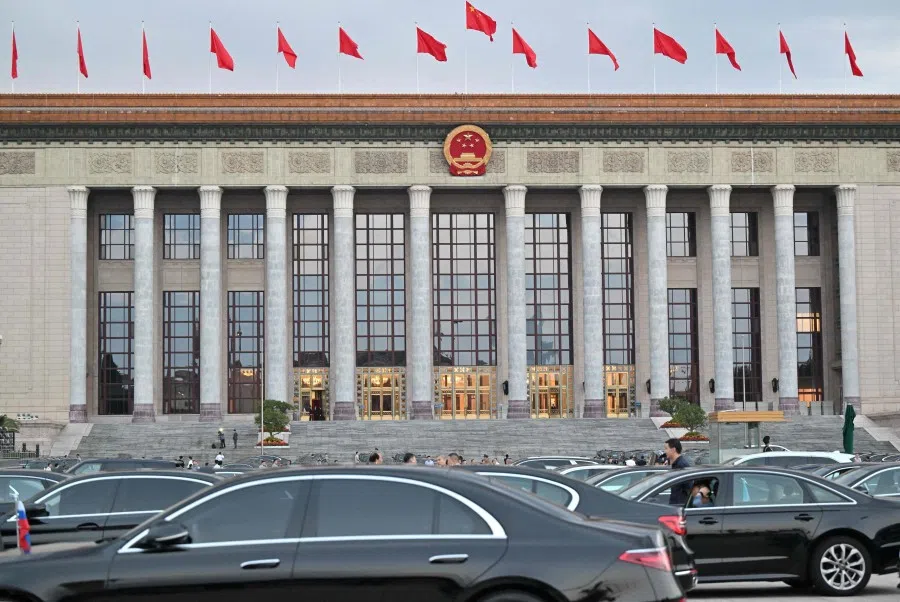‘I don’t want to work; I want to join the party’: China’s viral cry for stability
On Douyin, millions joke about quitting work to “serve the people”. But the humour masks real exhaustion — and a growing belief that life inside the system is safer than life outside it. Lianhe Zaobao’s China Desk looks into this trend.

In recent days, China’s short-video platform Douyin has been flooded with clips humorously declaring, “I don’t want to work; I want to join the party.”
In these videos, users — often migrant workers, delivery riders, factory hands, and online content creators — face the camera and say with mock sincerity: “I don’t want to work, and I don’t want to farm either. I just want to join the party and serve the people.”
Under Chinese hashtags like #DontWantToWork and #WantToJoinTheParty, which have together attracted hundreds of millions of views, the trend mixes irony with aspiration, revealing both fatigue with low-wage labour and a wry nod to official ideals.
The desirable and dangerous system
One account named “Wang Rui” (王瑞), which usually promotes traditional Chinese medicine probiotics for cattle and sheep, said: “I don’t want to feed cows anymore. I want to join the party, become a provincial governor or a minister — or if that doesn’t work, just a village head. Whether I hold office or not doesn’t matter; what matters is serving the people.”
Though the account has only a little over a thousand followers, this particular video received 38,000 likes and more than 700 comments.
Even if they cannot actually enter the system, poking fun at it online provides an apt outlet for their feelings.
Some netizens have remarked that the focus of this “oath” isn’t really about joining the party, but about not wanting to work. Yet, many others believe the emphasis lies precisely in the desire to join the party — to “serve the people” in the imagined sense of fulfilling a meaningful public role.
Of course, joining the party does not mean one can stop working. However, for many workers outside the official system, joining the party and serving the people symbolises entering the establishment — finally “making it to shore” by securing a stable job. Even if they cannot actually enter the system, poking fun at it online provides an apt outlet for their feelings.

Amid this wave of jokes, quite a few Douyin accounts have responded with irony of their own: “If you people really joined the party to serve the people, within three years you’d be on TV with your head bowed, saying, ‘I’ve let down the party, I’ve let down the country, I’ve let down the people.’” This, to some extent, reflects the complex perception that outsiders hold of the system: one that appears safe and stable, yet not without hypocrisy and risk.
As of the end of last year, the total number of Chinese Communist Party (CCP) members reached 100.27 million, an increase of nearly 1.09 million from the previous year.
Harder than ever to enter the system
The desire to join the party and enter the system is very real when viewed through the data. As of the end of last year, the total number of Chinese Communist Party (CCP) members reached 100.27 million, an increase of nearly 1.09 million from the previous year. Meanwhile, the number of applicants for the civil service exam has continued to climb, hitting a record high of 3.41 million last year.
For the ongoing 2026 civil service recruitment cycle, the eligibility age has been raised from 35 to 38, but the number of planned hires has been reduced by 1,600. This marks the first contraction after seven consecutive years of expansion since 2019. With the relaxed age limit and a growing number of graduates, competition is set to become even fiercer.
Li Manqing, acting CEO of Huatu Education — a company specialising in civil service exam training — told Southern Weekly that the reduction in national civil service recruitment offers a clear signal for local governments, state-owned enterprises, and public institutions, many of which may also reduce or even freeze hiring. “In the coming years, we can expect a gradual, small-scale contraction in recruitment.”
This trend aligns with the central government’s policy direction. Under the dual pressures of fiscal strain and technological advancement, Beijing aims to gradually downsize staffing levels and administrative headcount within the state system. The government work report released in March explicitly called for “strict control over the number of personnel supported by public finances.”

According to research by Zhang Jun, Ma Xinrong, and Liu Zhikuo from Fudan University’s China Centre for Economic Studies, China had a total of 68.46 million people supported by public finances as of 2020. While the overall number has continued to grow, the number of on-roll employees within the establishment has shown signs of stabilising, or even slightly declining.
...due to falling hospital profits, doctors in Henan, Guangxi, and Beijing experienced widespread pay cuts.
Trimming the fat
At the local level, reforms are already underway. In April last year, Henan province announced that, excluding schools and hospitals, it had streamlined 60.7% of its public institutions, abolishing 137 agencies and cutting staffing quotas by 46.9%. Earlier, Heilongjiang province launched a similar reform in 2018, and by the end of 2019, had reduced the number of public institutions by 51% and staffing by 29%.
With the economy slowing and both tax revenue and land-sale income shrinking, paying civil servants has become a growing burden for many local governments, with some even resorting to diverting funds from other earmarked projects to cover wages.
The National Audit Office’s 2024 fiscal audit report revealed that 16 provinces and 175 counties diverted a total of 4.16 billion RMB (US$586 million) last year to repay local government debts or pay public-sector salaries.
Public institutions such as hospitals and schools face similar financial pressures. Reports by 21st Century Business Herald and The Paper in 2023 noted that, due to falling hospital profits, doctors in Henan, Guangxi, and Beijing experienced widespread pay cuts. Some university teachers reported monthly salaries as low as 4,000 to 5,000 RMB, barely enough to make ends meet.
Not only have wages and bonuses at public institutions shrunk or been delayed, but profits at state-owned and state-controlled enterprises have also declined — their total profits for the first eight months of this year fell 2.7% year-on-year.

Meanwhile, reforms aimed at breaking the so-called “iron rice bowl” in the state sector are accelerating. In September last year, the state-owned Assets Supervision and Administration Commission of the State Council ordered that, by 2025, all state-owned enterprises must implement systems of “bottom-rank adjustment” and “exit for incompetence”. Under these measures, employees who consistently perform at the bottom may be demoted or dismissed, while those deemed unfit for their roles could have their contracts terminated.
Outside the establishment, layoffs and “optimisations” have become routine in major internet companies, property firms, and financial institutions.
Desire to enter the system fuelled by insecurity
Despite news of pay cuts and staffing reductions, enthusiasm for joining the system remains strong. Outside the establishment, layoffs and “optimisations” have become routine in major internet companies, property firms, and financial institutions.
According to a Caixin report in August this year, one major internet company’s workforce had fallen to 35,900 by the end of 2024, a drop of about 21% from its 2021 peak. Alibaba’s employee count also fell sharply from 255,000 in 2022 to 124,000 as of 31 March this year, a reduction of over 50%. The report noted that those over 35 years old are often the first to be “adjusted out”, a trend that has reshaped young people’s career preferences.
A university student in Shanghai preparing for the civil service exam in his hometown put it bluntly: “If you get laid off from a private company around 35, you have to start over in middle age. It’s just too insecure.”
The 2024 College Graduate Employability Report by zhaopin.com found that 73.1% of graduates hope to enter government agencies, public institutions, or central state-owned enterprises, while the share of graduates hoping to work for private firms has fallen from 25.1% in 2020 to 12.5% in 2024.
The gig economy as an option
Meanwhile, a growing number of middle-aged unemployed workers are being pushed into the gig economy, deepening the overall sense of insecurity in society. According to Caijing magazine, over 70% of China’s ride-hailing drivers joined the industry after losing their previous jobs.
An article in a September issue of The Economist noted that about 200 million people in China now participate in the gig economy — roughly 40% of the urban labour force. These platform-based workers enjoy flexibility but face unstable income, long hours, and minimal social protections. Many cannot afford homes or access basic public services and social security, making them the “vulnerable employed”.

This “gig-ification” trend is no longer confined to platforms like Didi or Meituan, but is spreading into manufacturing. Zhang Dandan, Deputy Dean of Peking University’s National School of Development and a researcher in labour economics, observed last year that traditional long-term, stable employment is increasingly replaced by short-term and gig-based hiring, which has become the dominant form of labour in many factories. Most of these workers lack long-term contracts, have low social insurance coverage, and struggle to protect their labour rights.
In a time of geopolitical uncertainty and slowing economic growth, the aspiration to “join the party, enter the system, and serve the people” now reflects a deeper longing for an imperfect but stable safe harbour.
From city service jobs to factory assembly lines, more people now live with employment instability and anxiety. In such a context, the relative stability of the state system appears all the more precious. As one private-sector employee put it: “It just feels safer to be in the system.”
The drive to join the establishment has not always been this strong. In the early years of China’s reform and opening up, many left government jobs to start businesses. A decade ago, amid the booming mobile internet era, it was common for civil servants to quit and join tech companies.
Between 2015 and 2016, applications for the national civil service exam fell sharply, even sparking public discussion about civil servant attrition.
However, in the aftermath of the pandemic, the trend reversed dramatically. In 2022, the number of national civil service exam applicants soared past two million for the first time and has continued to rise each year. In a time of geopolitical uncertainty and slowing economic growth, the aspiration to “join the party, enter the system, and serve the people” now reflects a deeper longing for an imperfect but stable safe harbour.
This article was first published in Lianhe Zaobao as “不想上班、不想种田,想入党?”.





